Eni Bundle
What Drives Eni's Strategic Compass?
Every successful company needs a clear direction, and for energy giant Eni, that direction is defined by its mission, vision, and core values. These guiding principles shape its identity and influence every strategic decision. Understanding these elements is key to appreciating Eni's approach to the future of energy.
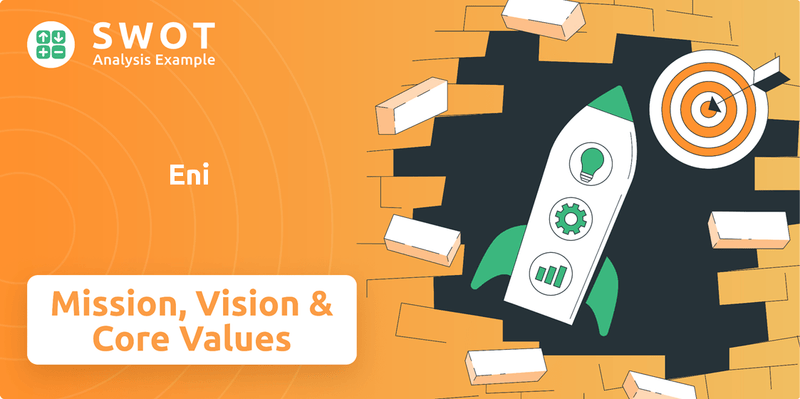
Delving into Eni SWOT Analysis is just the beginning; grasping Eni's mission, vision, and core values provides a deeper understanding of its commitment to sustainability and its strategic objectives. These principles are not just words; they are the foundation upon which Eni builds its corporate governance and navigates the complexities of the global energy transition. Explore how Eni integrates its values to create value for shareholders and communities.
Key Takeaways
- Eni's mission, vision, and values are crucial for navigating the energy transition.
- Commitment to a just energy transition and carbon neutrality by 2050 are key strengths.
- Values like integrity, transparency, and operational excellence guide strategic decisions.
- Investments in renewables and integrated business models reflect these guiding principles.
- Alignment with these principles is vital for long-term success and stakeholder trust.
Mission: What is Eni Mission Statement?
Eni's mission is 'to be an energy company that concretely supports a just energy transition, with the objective of preserving our planet and promoting an efficient and sustainable access to energy for all.'
Let's delve into the specifics of Eni's mission statement and its implications.
The Eni Mission centers on a "just energy transition." This signals a commitment to both environmental sustainability and equitable energy access. Eni aims to balance these often-competing goals through strategic initiatives.
The mission statement highlights several key elements. These include environmental preservation, sustainable energy access, and a commitment to ethical business practices. These elements guide Eni's strategic decisions.
Eni's products and services reflect a transitional market scope, spanning traditional oil and gas to renewable energy sources. This diversification is crucial for achieving its mission. This approach is part of the overall Eni Company Strategy.
A unique value proposition lies in Eni’s commitment to a 'just energy transition.' This involves balancing environmental preservation with promoting sustainable energy access globally. This commitment is a core aspect of Eni's vision for the future.
Eni's mission is reflected in its business operations through investments in renewable energy projects and the development of biofuels. For instance, Eni allocated significant investments towards renewable energy in 2024. Eni's sustainable mobility business, Enilive, is a key example.
The mission is strongly oriented towards Eni Sustainability and social responsibility, aiming for a balance between economic activity and positive environmental and social impact. This approach is further detailed in the Marketing Strategy of Eni.
Understanding What is Eni's mission statement? is crucial for grasping the company's strategic direction. Eni's mission statement is not just a set of words; it's a roadmap for the company's future. It influences everything from investment decisions to partnerships. The company's focus on a just energy transition is a response to global challenges. This is a key component of Eni Corporate Governance.
Eni SWOT Analysis
- Complete SWOT Breakdown
- Fully Customizable
- Editable in Excel & Word
- Professional Formatting
- Investor-Ready Format
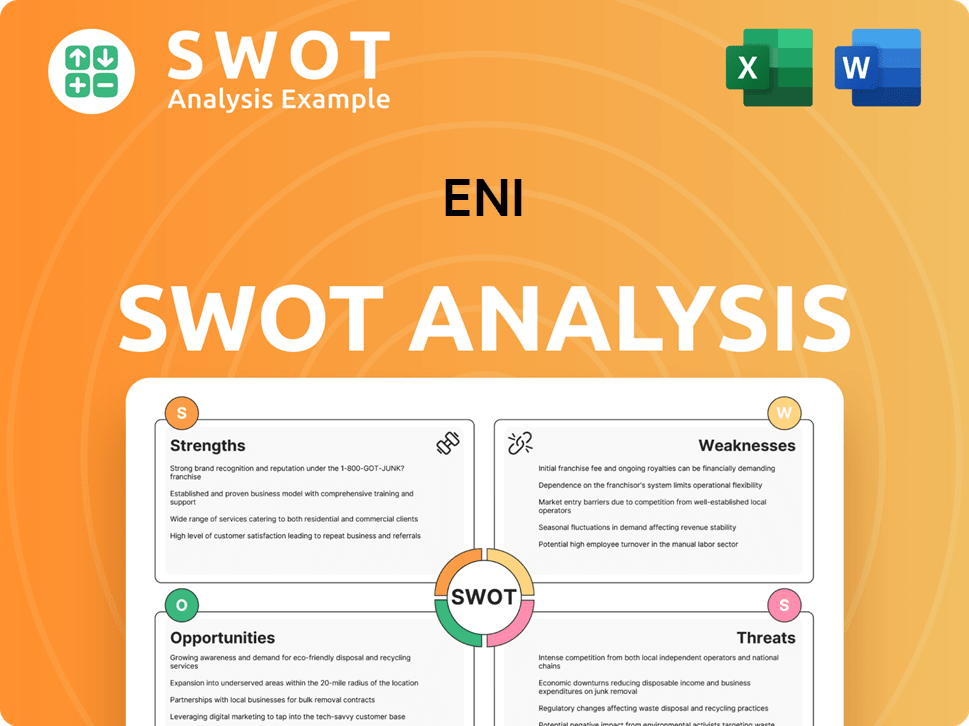
Vision: What is Eni Vision Statement?
Eni's vision is to produce and sell increasingly decarbonized and customer-oriented energy products and services through the use of the best available technologies and the constant search for cutting-edge solutions. The ultimate goal is to achieve carbon neutrality by 2050, placing scientific research and technological innovation at the base of its approach, combined with an ever-increasing diversification of supply sources.
Let's delve into the specifics of Eni's vision, exploring its implications for the future of the energy sector and the company's strategic direction.
At the heart of Eni's vision is a commitment to decarbonization. This involves a significant shift away from traditional fossil fuels towards renewable energy sources and low-carbon technologies. The aim is to reduce the environmental impact and contribute to global efforts to combat climate change. This is a key component of the Growth Strategy of Eni.
Eni aims to provide energy products and services that are increasingly tailored to customer needs. This involves understanding evolving demands and offering innovative solutions. This focus on the customer is crucial for long-term success in a changing energy market.
Technological advancement is a cornerstone of Eni's vision. The company is investing heavily in research and development (R&D) to discover cutting-edge solutions. This includes exploring biofuels, circular economy initiatives, and other innovative technologies to support its vision.
Eni has set an ambitious goal to achieve carbon neutrality by 2050. This requires a comprehensive strategy that includes reducing emissions from its operations, investing in renewable energy projects, and offsetting any remaining emissions through carbon capture and storage or other methods. This is a key objective for Eni's long-term vision.
To ensure energy security and resilience, Eni is diversifying its supply sources. This involves expanding its portfolio of renewable energy projects, exploring new partnerships, and investing in different energy technologies. This diversification is a key element of Eni's corporate governance.
Eni's vision is supported by concrete actions. In 2024, the company increased its R&D spending by 15%, focusing on biofuels and circular economy initiatives. Furthermore, Eni has set an intermediate target to reduce net carbon emissions by 80% by 2040, demonstrating a commitment to its long-term vision. These actions are crucial for achieving Eni's mission.
In summary, Eni's vision represents a bold commitment to reshape the energy landscape. This is a strategic roadmap for the future, driven by innovation, sustainability, and a customer-centric approach. This vision is a key element of Eni's core values and business ethics.
Eni PESTLE Analysis
- Covers All 6 PESTLE Categories
- No Research Needed – Save Hours of Work
- Built by Experts, Trusted by Consultants
- Instant Download, Ready to Use
- 100% Editable, Fully Customizable
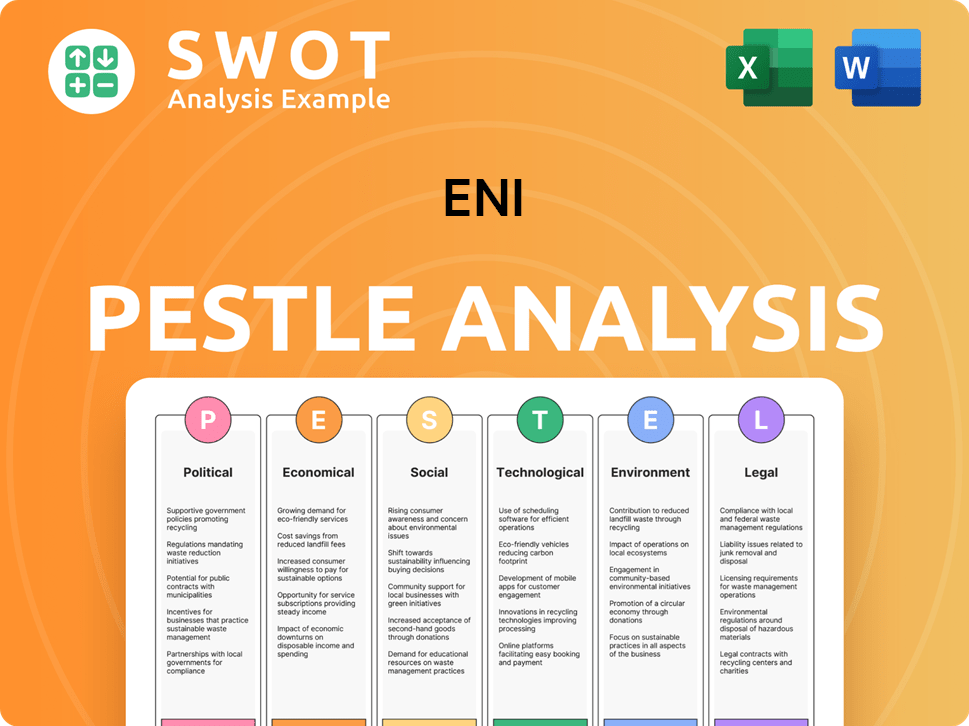
Values: What is Eni Core Values Statement?
Understanding Eni's core values is crucial to grasping the company's operational ethos and its approach to long-term sustainability. These values guide Eni's decisions and actions, shaping its interactions with stakeholders and its impact on the world.
Integrity is a cornerstone of Eni's operations, emphasizing responsibility, fairness, honesty, and transparency. This commitment is evident in their adherence to regulations, exemplified by their compliance with the European Corporate Sustainability Reporting Directive (CSRD) and continued voluntary reporting, showcasing a dedication to ethical conduct and open communication. This commitment ensures that Eni builds trust with stakeholders and maintains a strong reputation, which is critical for long-term success.
Eni values the dignity of individuals and human rights, fostering an inclusive work environment. This is reflected in their Diversity and Inclusion policies, which champion uniqueness and guarantee equal opportunities for all employees. Eni actively works to ensure its transformation benefits communities and strengthens actions against violence against women, often in collaboration with international organizations, demonstrating a commitment to social responsibility.
Transparency involves providing clear and truthful information to stakeholders and sharing goals and results. This is evident in their extensive reporting, including the Annual Report and the 'Eni for 2024' sustainability report, which offer detailed insights into their performance, strategies, and ESG practices. This approach builds trust with investors, customers, and the wider community, ensuring accountability and fostering strong relationships.
Eni is committed to fostering inclusive development in the territories where it operates, working towards efficient and sustainable access to energy and supporting local communities. This is demonstrated through over 100 local development projects active in 21 countries in 2024, focusing on areas like access to energy, water, healthcare, and education, aligned with the UN Sustainable Development Goals. This commitment to local development demonstrates Eni's long-term vision and its dedication to shared prosperity.
These Eni Core Values are fundamental to Eni's identity, shaping its strategic objectives and influencing its approach to sustainability and stakeholder engagement. Understanding these values provides a comprehensive view of Eni's commitment to responsible business practices. Next, we will explore how the Eni Mission and Eni Vision influence the company's strategic decisions.
How Mission & Vision Influence Eni Business?
Eni's Eni Mission and Eni Vision are not just aspirational statements; they are the cornerstones that shape its strategic decisions and drive its transformation. These statements directly influence the company's investments, partnerships, and operational shifts, ensuring a cohesive approach to the evolving energy landscape.
Eni's strategic plan for 2025-2028 is explicitly designed to generate strong financial returns while delivering progressively lower-carbon energy solutions. This plan is a direct manifestation of the company's commitment to its mission and vision of producing and selling decarbonized energy products and services.
- Increased Investment in Renewable Energy: Eni has significantly increased its investments in renewable energy projects, aiming to substantially grow its green energy production capacity. Plenitude, Eni's renewable energy arm, aims to reach 15 GW of installed capacity by 2030, up from over 4 GW in 2024. This aligns with their mission to support a just energy transition and their vision of producing decarbonized energy.
- Transformation of Refining and Chemicals Businesses: Eni is actively converting traditional refineries into biorefineries and restructuring its chemicals business, Versalis, to focus on sustainable chemistry, biorefining, and energy storage. This strategic shift is a concrete example of their commitment to decarbonization and developing new, high-return activities related to the energy transition, as outlined in their vision and strategic plan.
- Development of the 'Satellite Model': Eni is strengthening its industrial and customer businesses by integrating them along the value chain through a 'Satellite model,' exemplified by entities like Plenitude and Enilive, and soon, a Carbon Capture and Storage (CCS) satellite company. This model allows Eni to capitalize on emerging opportunities in the energy transition and aligns with their vision of diversifying supply sources and developing cutting-edge solutions.
The Eni Company Strategy is profoundly influenced by its mission and vision, particularly in product development and market expansion. This strategic direction is geared towards biofuels, renewables, and sustainable chemicals, reflecting a shift towards a lower-carbon future.
Eni actively seeks partnerships with entities that contribute to its sustainability goals. Acquisitions, such as the purchase of Neptune, are carefully integrated into the broader strategy of maintaining a strong traditional business while accelerating the energy transition. These moves are guided by the Eni Core Values of innovation and responsibility.
The impact of Eni's mission and vision is evident in measurable results. For instance, Eni reduced its net Scope 1 and 2 emissions by 37% overall in 2024 compared to 2018 levels. Enilive's increased biorefining capacity and Plenitude's growth in renewable capacity also serve as key performance indicators, demonstrating Eni's commitment to sustainability.
CEO Claudio Descalzi emphasizes the importance of anticipating and transforming in a rapidly changing energy landscape, highlighting that this ability is a distinctive trait of Eni. This underscores how the mission and vision shape both long-term planning and day-to-day operations, ensuring that the company remains agile and forward-thinking. This is part of Eni Corporate Governance.
Eni's approach to stakeholder engagement is also influenced by its mission and vision. The company aims to create value for all stakeholders, including shareholders, employees, and communities, by focusing on sustainable practices and innovative solutions. The Eni's long-term vision is to become a leader in the energy transition.
To fully understand Eni's current strategic direction, it's beneficial to consider its historical context. A Brief History of Eni provides valuable insights into the company's evolution and the factors that have shaped its mission, vision, and core values over time.
In essence, Eni's Eni Mission, Eni Vision, and Eni Core Values are not just words; they are the driving forces behind its strategic decisions, influencing everything from investment choices to operational practices. This commitment to sustainability and innovation positions Eni to navigate the complexities of the energy transition successfully. Ready to explore how Eni is refining and improving its core principles? Let's move on to the next chapter: Core Improvements to Company's Mission and Vision.
Eni Business Model Canvas
- Complete 9-Block Business Model Canvas
- Effortlessly Communicate Your Business Strategy
- Investor-Ready BMC Format
- 100% Editable and Customizable
- Clear and Structured Layout
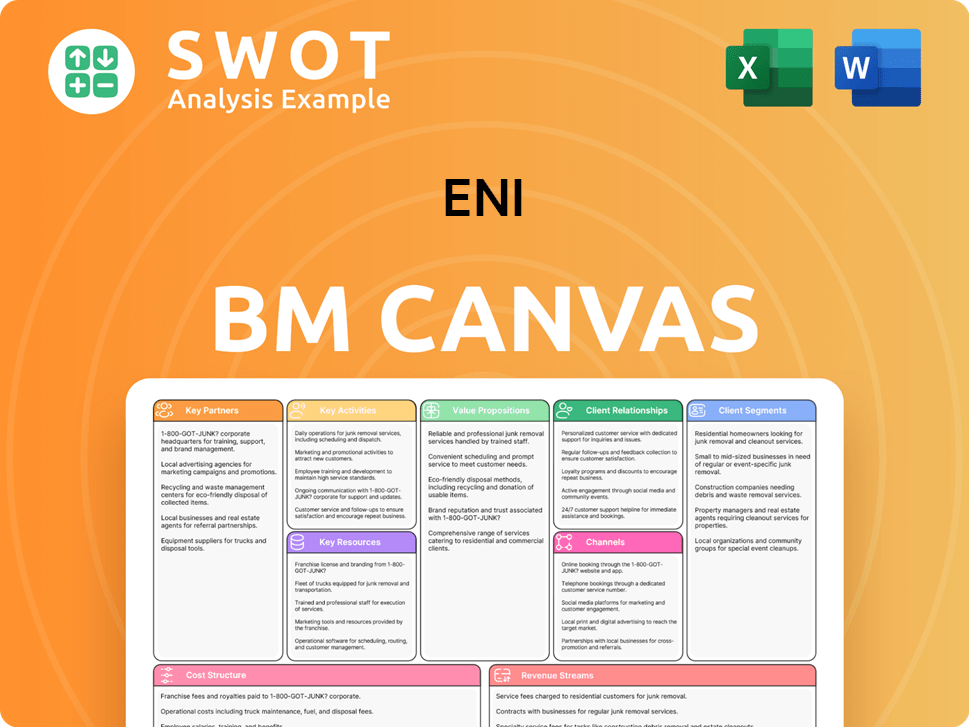
What Are Mission & Vision Improvements?
While Eni's foundational statements demonstrate a commitment to a sustainable future, strategic refinements can further solidify its position as a leader in the evolving energy landscape. These enhancements will ensure Eni remains competitive and responsive to stakeholder expectations.
Integrating more explicit, short-term renewable energy capacity targets directly within the core Eni Vision statement would amplify the company's commitment to the energy transition. This would provide clearer benchmarks for progress, aligning with the urgency of climate action and potentially attracting further investment; for example, Eni could aim to increase its renewable energy capacity by 50% by 2030, building on its current Plenitude targets. This is crucial in a market where investors increasingly prioritize companies with ambitious decarbonization plans, as demonstrated by the growing Environmental, Social, and Governance (ESG) investment trend, which reached over $40 trillion globally in 2024.
Enriching the mission with more specific commitments related to workforce transition, community engagement, and equitable access to new energy technologies would underscore the social dimension of its sustainability efforts. This could involve establishing programs for reskilling and upskilling workers in fossil-fuel-dependent regions, and investing in community projects to support a just transition. This approach is increasingly vital, as stakeholders, including governments and investors, are placing greater emphasis on the social impact of corporate activities, as seen in the rise of the Socially Responsible Investing (SRI) market, which is projected to reach $50 trillion by 2026.
The Eni Company Strategy should evolve to embrace emerging technologies like advanced energy storage and hydrogen, which are becoming increasingly significant in the energy transition. Furthermore, the company must adapt its mission and vision to reflect changing consumer behaviors, with a growing demand for cleaner energy options and electric mobility. For example, Eni could invest in expanding its electric vehicle charging infrastructure and developing innovative energy solutions tailored to evolving consumer needs. This adaptability is essential for maintaining market relevance and capitalizing on new growth opportunities, with the global hydrogen market alone projected to reach $130 billion by 2030.
Eni must broaden its focus on sustainability to encompass supply chain ethics and biodiversity, reflecting the evolving landscape of stakeholder concerns. This could involve implementing rigorous environmental and social standards for suppliers and investing in biodiversity conservation projects. Integrating these aspects will enhance Eni's reputation and build stakeholder trust, as demonstrated by the increasing importance of supply chain transparency and biodiversity in corporate reporting frameworks. For more details on Eni's core values, you can refer to Mission, Vision & Core Values of Eni.
How Does Eni Implement Corporate Strategy?
Implementing a company's mission, vision, and core values is crucial for translating strategic intent into tangible actions and outcomes. This involves aligning operational activities, resource allocation, and stakeholder engagement with the organization's stated principles.
Eni demonstrates its commitment to its Eni Vision through initiatives like Plenitude, a subsidiary focused on renewables, energy solutions, and electric mobility. Plenitude's ambitious targets and concrete actions showcase the company's dedication to producing and selling decarbonized and customer-oriented energy, directly supporting the Eni Mission.
- Renewable Capacity Expansion: Plenitude aims to reach 15 GW of installed renewable capacity by 2030. As of early 2024, Plenitude has already installed over 2.2 GW of renewable capacity.
- EV Charging Network: Plenitude is expanding its network of EV charging points, contributing to the growth of sustainable mobility solutions.
- Strategic Partnerships: Plenitude is actively seeking partnerships to accelerate its growth in the renewable energy sector.
The transformation of Eni's traditional refining business into biorefineries is a tangible example of implementing its Eni Mission, which emphasizes a just energy transition and decarbonized products. This strategic shift involves repurposing existing assets and expertise, demonstrating a commitment to a lower-carbon future and aligning with Eni's long-term vision.
Leadership plays a critical role in reinforcing Eni's mission, vision, and core values. CEO Claudio Descalzi's consistent communication on the energy transition and sustainability integration helps embed these principles throughout the organization, ensuring alignment with Eni Company Strategy.
Eni communicates its mission, vision, and progress through various channels, including annual reports, sustainability reports (e.g., 'Eni for 2024'), investor presentations, and its corporate website. These platforms provide transparency and allow stakeholders to assess the alignment between stated values and actual practices, fostering trust and accountability in Eni Corporate Governance.
Eni demonstrates its Eni Core Values through concrete actions, such as local development projects in 21 countries, promoting long-term partnerships. The company's adherence to human rights, workplace safety initiatives, and efforts to prevent gender-based violence further illustrate the practical application of its values, showcasing Eni's impact on society.
Eni utilizes formal programs and systems to ensure alignment with its mission and values. This includes its Diversity & Inclusion Policy and participation in initiatives like the UN Global Compact, demonstrating Eni's commitment to sustainability. The integrated reporting framework, combining financial and sustainability performance, serves as a system for accountability and alignment, offering insights into Eni's approach to environmental responsibility. To gain a broader perspective on Eni's market position, consider reviewing the Competitors Landscape of Eni.
- Diversity & Inclusion: Eni's Diversity & Inclusion Policy outlines specific goals and initiatives to promote a diverse and inclusive workplace.
- UN Global Compact: Eni actively participates in the UN Global Compact, adhering to its principles on human rights, labor, environment, and anti-corruption.
- Integrated Reporting: Eni's integrated reporting framework provides a comprehensive view of its financial and sustainability performance, allowing stakeholders to assess its progress.
Eni Porter's Five Forces Analysis
- Covers All 5 Competitive Forces in Detail
- Structured for Consultants, Students, and Founders
- 100% Editable in Microsoft Word & Excel
- Instant Digital Download – Use Immediately
- Compatible with Mac & PC – Fully Unlocked
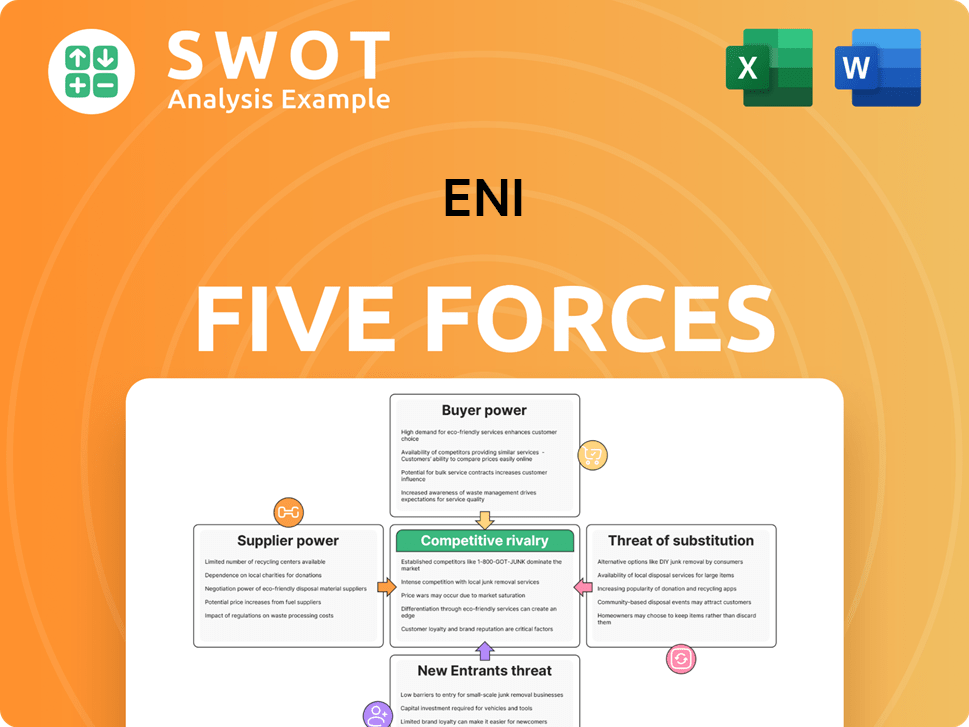
Related Blogs
- What are Mission Vision & Core Values of Eni Company?
- What is Competitive Landscape of Eni Company?
- What is Growth Strategy and Future Prospects of Eni Company?
- How Does Eni Company Work?
- What is Sales and Marketing Strategy of Eni Company?
- Who Owns Eni Company?
- What is Customer Demographics and Target Market of Eni Company?
Disclaimer
All information, articles, and product details provided on this website are for general informational and educational purposes only. We do not claim any ownership over, nor do we intend to infringe upon, any trademarks, copyrights, logos, brand names, or other intellectual property mentioned or depicted on this site. Such intellectual property remains the property of its respective owners, and any references here are made solely for identification or informational purposes, without implying any affiliation, endorsement, or partnership.
We make no representations or warranties, express or implied, regarding the accuracy, completeness, or suitability of any content or products presented. Nothing on this website should be construed as legal, tax, investment, financial, medical, or other professional advice. In addition, no part of this site—including articles or product references—constitutes a solicitation, recommendation, endorsement, advertisement, or offer to buy or sell any securities, franchises, or other financial instruments, particularly in jurisdictions where such activity would be unlawful.
All content is of a general nature and may not address the specific circumstances of any individual or entity. It is not a substitute for professional advice or services. Any actions you take based on the information provided here are strictly at your own risk. You accept full responsibility for any decisions or outcomes arising from your use of this website and agree to release us from any liability in connection with your use of, or reliance upon, the content or products found herein.